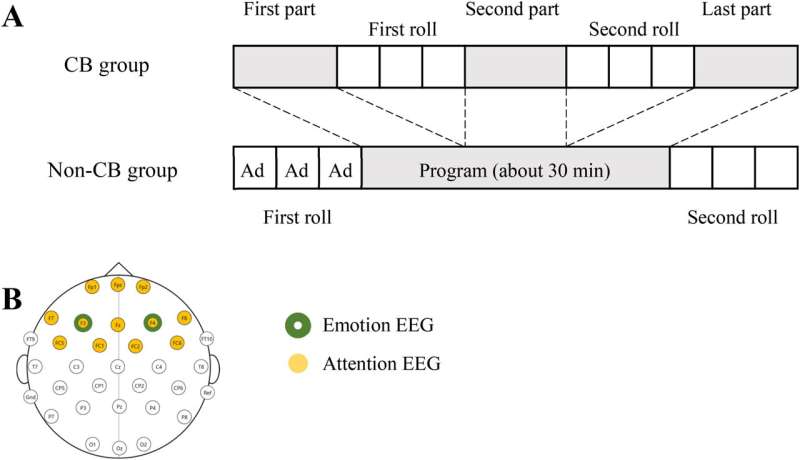The effects of in-stream video advertising on ad information encoding have long remained a mystery. A recent study, published in the Journal of Advertising and led by Professor Sung-Phil Kim and his research team in the Department of Biomedical Engineering at UNIST, sheds light on this subject.
By integrating the negative emotion–memory model (NEMM) and the limited capacity model of motivated–mediated message processing (LC4MP), researchers investigated how advertising content is encoded within the context of in-stream video advertising.
The study involved comparing two groups: One exposed to mid-roll ads and those exposed to pre- and post-roll ads. Through electroencephalography (EEG) analysis, which measures brainwave activity, the research team assessed negative emotions and bottom-up attention during advertisement viewing.
Findings from the study indicate that while viewers experienced initial negative emotions induced by mid-roll ads, these feelings were attenuated with subsequent mid-roll exposures. Interestingly, negative emotions resulting from mid-roll ads reduced the influence of bottom-up attention in information encoding. Conversely, pre- and post-roll ads did not elicit negative emotions; thus, bottom-up attention played a significant role in encoding information from these types of advertisements.
Furthermore, despite experiencing transient negative reactions during mid-roll exposures, viewers’ purchase intention for advertised products remained unaffected—an important insight for advertisers seeking to understand consumer behavior.
“This research provides valuable insights into how intermediate advertisements impact memory formation,” explained Professor Kim. “Understanding how negative emotions influence memorability can enhance advertising effectiveness and revenue generation.”
More information:
Seungji Lee et al, The Effects of In-Stream Video Advertising on Ad Information Encoding: A Neurophysiological Study, Journal of Advertising (2023). DOI: 10.1080/00913367.2023.2222782
Provided by
Ulsan National Institute of Science and Technology
Citation:
Study sheds light on the impact of in-stream video advertising on ad information encoding (2023, August 18)
retrieved 27 August 2023
from https://phys.org/news/2023-08-impact-in-stream-video-advertising-ad.html
This document is subject to copyright. Apart from any fair dealing for the purpose of private study or research, no
part may be reproduced without the written permission. The content is provided for information purposes only.
Credit: Source link




